Advanced Accounting Theory: Australia Post Integrated Reporting Review
VerifiedAdded on 2022/09/22
|6
|1186
|28
Report
AI Summary
This report analyzes Australia Post's 2019 Integrated Report through the lens of legitimacy theory. The study begins with an introduction to integrated reporting and its role in articulating a company's broader societal contributions. It then defines legitimacy theory, emphasizing the importance of aligning organizational values with societal expectations. The core of the report examines Australia Post's integrated reporting practices, summarizing key points from the report, such as their commitment to environmental sustainability through electric vehicles and carbon footprint reduction, as well as their investments in indigenous and social suppliers. The analysis critically reviews these disclosures within the framework of legitimacy theory, highlighting how Australia Post strategically uses integrated information to enhance its legitimacy with stakeholders and maintain a social contract. The conclusion reinforces the importance of continuous improvement in disclosure, balancing financial performance with social and environmental impacts, and adapting to societal changes to ensure long-term legitimacy.
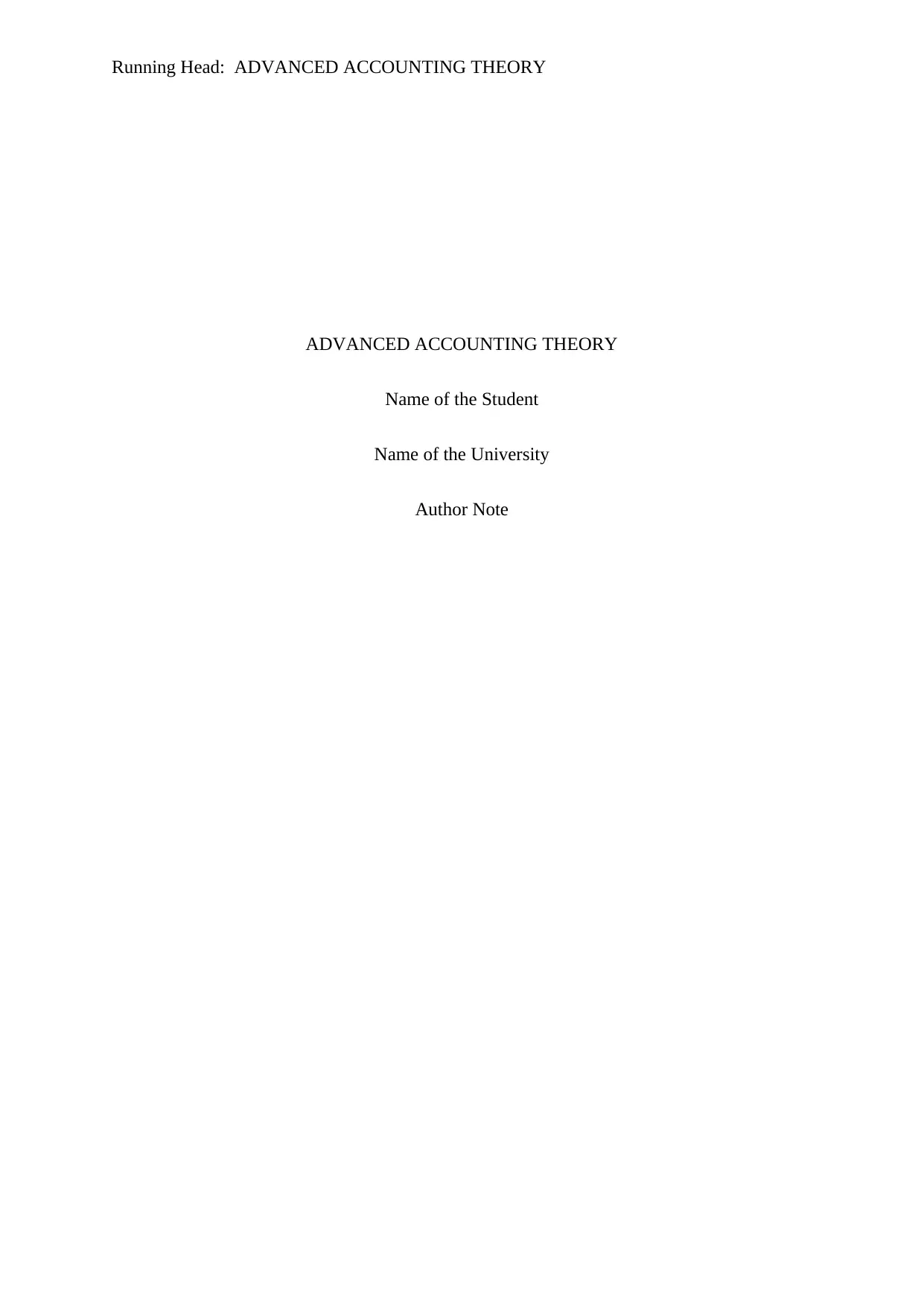
Running Head: ADVANCED ACCOUNTING THEORY
ADVANCED ACCOUNTING THEORY
Name of the Student
Name of the University
Author Note
ADVANCED ACCOUNTING THEORY
Name of the Student
Name of the University
Author Note
Paraphrase This Document
Need a fresh take? Get an instant paraphrase of this document with our AI Paraphraser
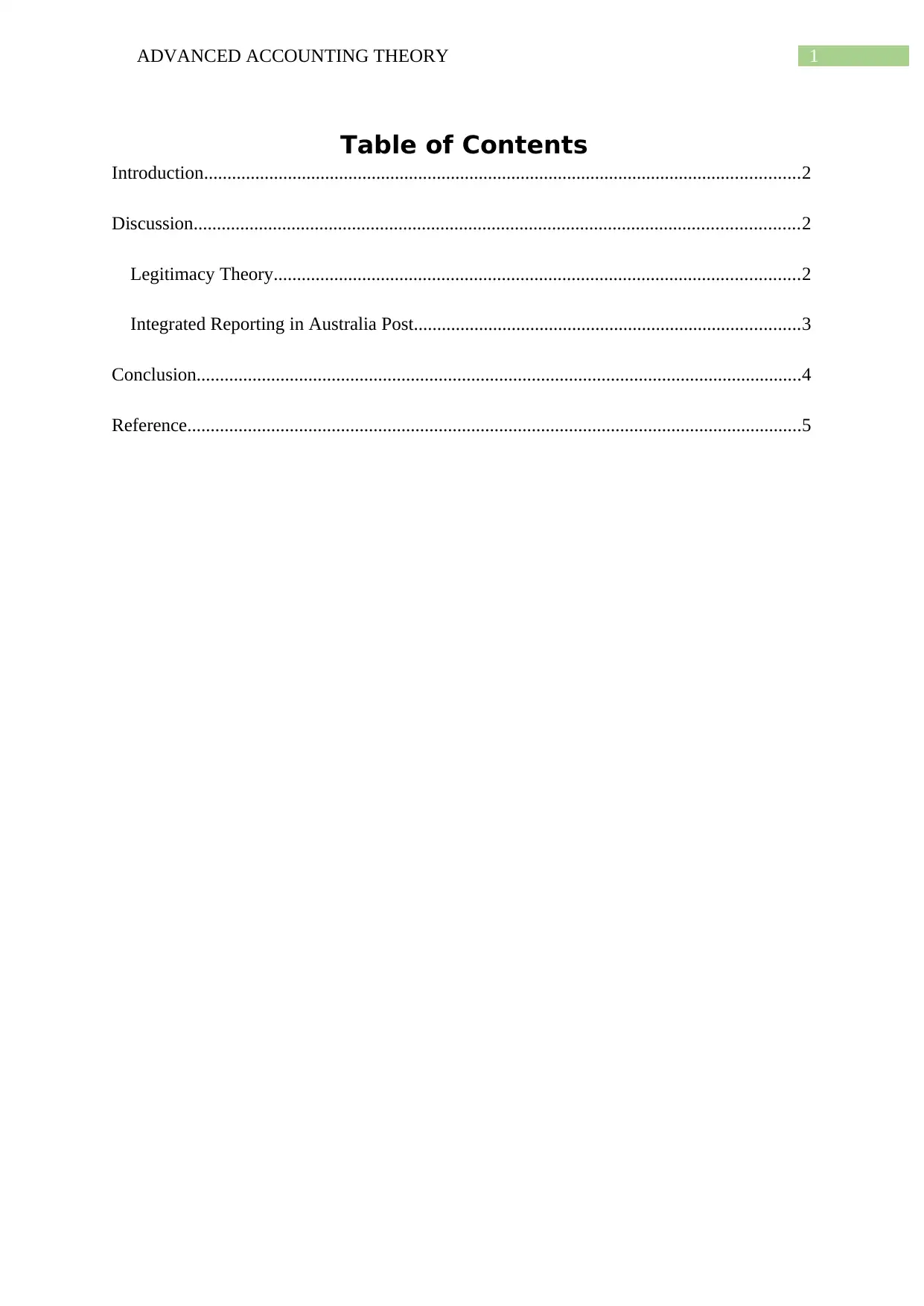
1ADVANCED ACCOUNTING THEORY
Table of Contents
Introduction................................................................................................................................2
Discussion..................................................................................................................................2
Legitimacy Theory.................................................................................................................2
Integrated Reporting in Australia Post...................................................................................3
Conclusion..................................................................................................................................4
Reference....................................................................................................................................5
Table of Contents
Introduction................................................................................................................................2
Discussion..................................................................................................................................2
Legitimacy Theory.................................................................................................................2
Integrated Reporting in Australia Post...................................................................................3
Conclusion..................................................................................................................................4
Reference....................................................................................................................................5
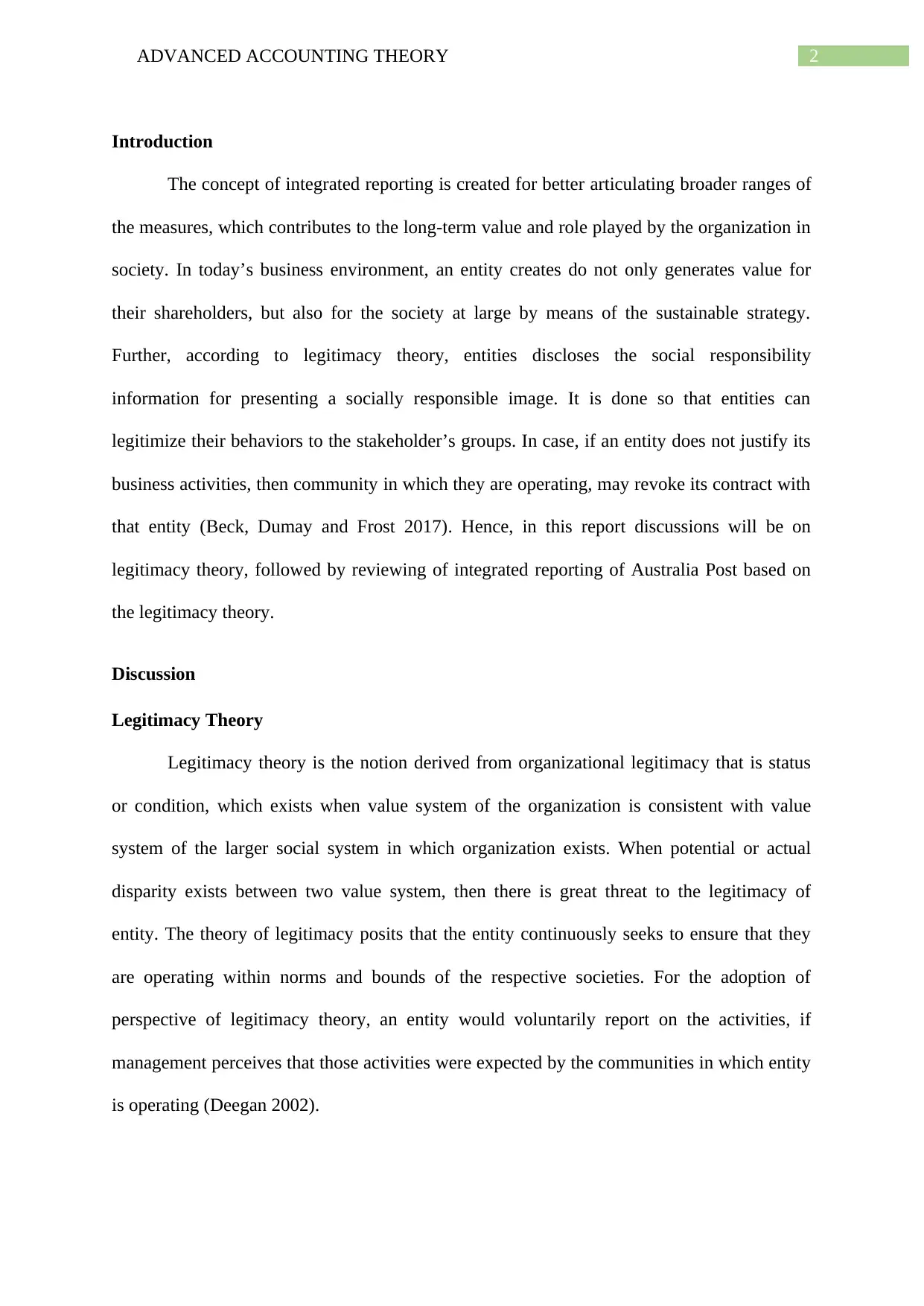
2ADVANCED ACCOUNTING THEORY
Introduction
The concept of integrated reporting is created for better articulating broader ranges of
the measures, which contributes to the long-term value and role played by the organization in
society. In today’s business environment, an entity creates do not only generates value for
their shareholders, but also for the society at large by means of the sustainable strategy.
Further, according to legitimacy theory, entities discloses the social responsibility
information for presenting a socially responsible image. It is done so that entities can
legitimize their behaviors to the stakeholder’s groups. In case, if an entity does not justify its
business activities, then community in which they are operating, may revoke its contract with
that entity (Beck, Dumay and Frost 2017). Hence, in this report discussions will be on
legitimacy theory, followed by reviewing of integrated reporting of Australia Post based on
the legitimacy theory.
Discussion
Legitimacy Theory
Legitimacy theory is the notion derived from organizational legitimacy that is status
or condition, which exists when value system of the organization is consistent with value
system of the larger social system in which organization exists. When potential or actual
disparity exists between two value system, then there is great threat to the legitimacy of
entity. The theory of legitimacy posits that the entity continuously seeks to ensure that they
are operating within norms and bounds of the respective societies. For the adoption of
perspective of legitimacy theory, an entity would voluntarily report on the activities, if
management perceives that those activities were expected by the communities in which entity
is operating (Deegan 2002).
Introduction
The concept of integrated reporting is created for better articulating broader ranges of
the measures, which contributes to the long-term value and role played by the organization in
society. In today’s business environment, an entity creates do not only generates value for
their shareholders, but also for the society at large by means of the sustainable strategy.
Further, according to legitimacy theory, entities discloses the social responsibility
information for presenting a socially responsible image. It is done so that entities can
legitimize their behaviors to the stakeholder’s groups. In case, if an entity does not justify its
business activities, then community in which they are operating, may revoke its contract with
that entity (Beck, Dumay and Frost 2017). Hence, in this report discussions will be on
legitimacy theory, followed by reviewing of integrated reporting of Australia Post based on
the legitimacy theory.
Discussion
Legitimacy Theory
Legitimacy theory is the notion derived from organizational legitimacy that is status
or condition, which exists when value system of the organization is consistent with value
system of the larger social system in which organization exists. When potential or actual
disparity exists between two value system, then there is great threat to the legitimacy of
entity. The theory of legitimacy posits that the entity continuously seeks to ensure that they
are operating within norms and bounds of the respective societies. For the adoption of
perspective of legitimacy theory, an entity would voluntarily report on the activities, if
management perceives that those activities were expected by the communities in which entity
is operating (Deegan 2002).
⊘ This is a preview!⊘
Do you want full access?
Subscribe today to unlock all pages.

Trusted by 1+ million students worldwide
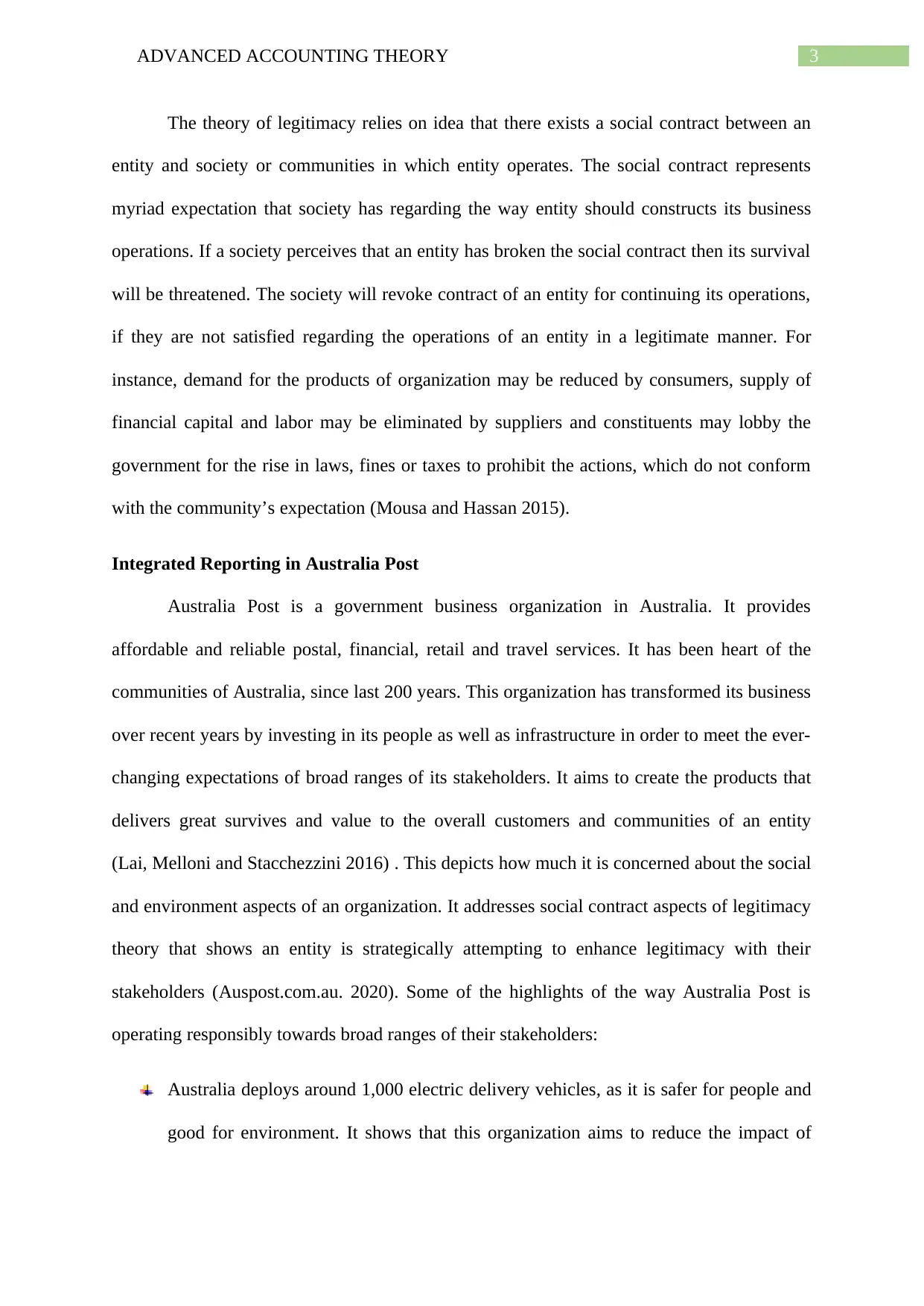
3ADVANCED ACCOUNTING THEORY
The theory of legitimacy relies on idea that there exists a social contract between an
entity and society or communities in which entity operates. The social contract represents
myriad expectation that society has regarding the way entity should constructs its business
operations. If a society perceives that an entity has broken the social contract then its survival
will be threatened. The society will revoke contract of an entity for continuing its operations,
if they are not satisfied regarding the operations of an entity in a legitimate manner. For
instance, demand for the products of organization may be reduced by consumers, supply of
financial capital and labor may be eliminated by suppliers and constituents may lobby the
government for the rise in laws, fines or taxes to prohibit the actions, which do not conform
with the community’s expectation (Mousa and Hassan 2015).
Integrated Reporting in Australia Post
Australia Post is a government business organization in Australia. It provides
affordable and reliable postal, financial, retail and travel services. It has been heart of the
communities of Australia, since last 200 years. This organization has transformed its business
over recent years by investing in its people as well as infrastructure in order to meet the ever-
changing expectations of broad ranges of its stakeholders. It aims to create the products that
delivers great survives and value to the overall customers and communities of an entity
(Lai, Melloni and Stacchezzini 2016) . This depicts how much it is concerned about the social
and environment aspects of an organization. It addresses social contract aspects of legitimacy
theory that shows an entity is strategically attempting to enhance legitimacy with their
stakeholders (Auspost.com.au. 2020). Some of the highlights of the way Australia Post is
operating responsibly towards broad ranges of their stakeholders:
Australia deploys around 1,000 electric delivery vehicles, as it is safer for people and
good for environment. It shows that this organization aims to reduce the impact of
The theory of legitimacy relies on idea that there exists a social contract between an
entity and society or communities in which entity operates. The social contract represents
myriad expectation that society has regarding the way entity should constructs its business
operations. If a society perceives that an entity has broken the social contract then its survival
will be threatened. The society will revoke contract of an entity for continuing its operations,
if they are not satisfied regarding the operations of an entity in a legitimate manner. For
instance, demand for the products of organization may be reduced by consumers, supply of
financial capital and labor may be eliminated by suppliers and constituents may lobby the
government for the rise in laws, fines or taxes to prohibit the actions, which do not conform
with the community’s expectation (Mousa and Hassan 2015).
Integrated Reporting in Australia Post
Australia Post is a government business organization in Australia. It provides
affordable and reliable postal, financial, retail and travel services. It has been heart of the
communities of Australia, since last 200 years. This organization has transformed its business
over recent years by investing in its people as well as infrastructure in order to meet the ever-
changing expectations of broad ranges of its stakeholders. It aims to create the products that
delivers great survives and value to the overall customers and communities of an entity
(Lai, Melloni and Stacchezzini 2016) . This depicts how much it is concerned about the social
and environment aspects of an organization. It addresses social contract aspects of legitimacy
theory that shows an entity is strategically attempting to enhance legitimacy with their
stakeholders (Auspost.com.au. 2020). Some of the highlights of the way Australia Post is
operating responsibly towards broad ranges of their stakeholders:
Australia deploys around 1,000 electric delivery vehicles, as it is safer for people and
good for environment. It shows that this organization aims to reduce the impact of
Paraphrase This Document
Need a fresh take? Get an instant paraphrase of this document with our AI Paraphraser
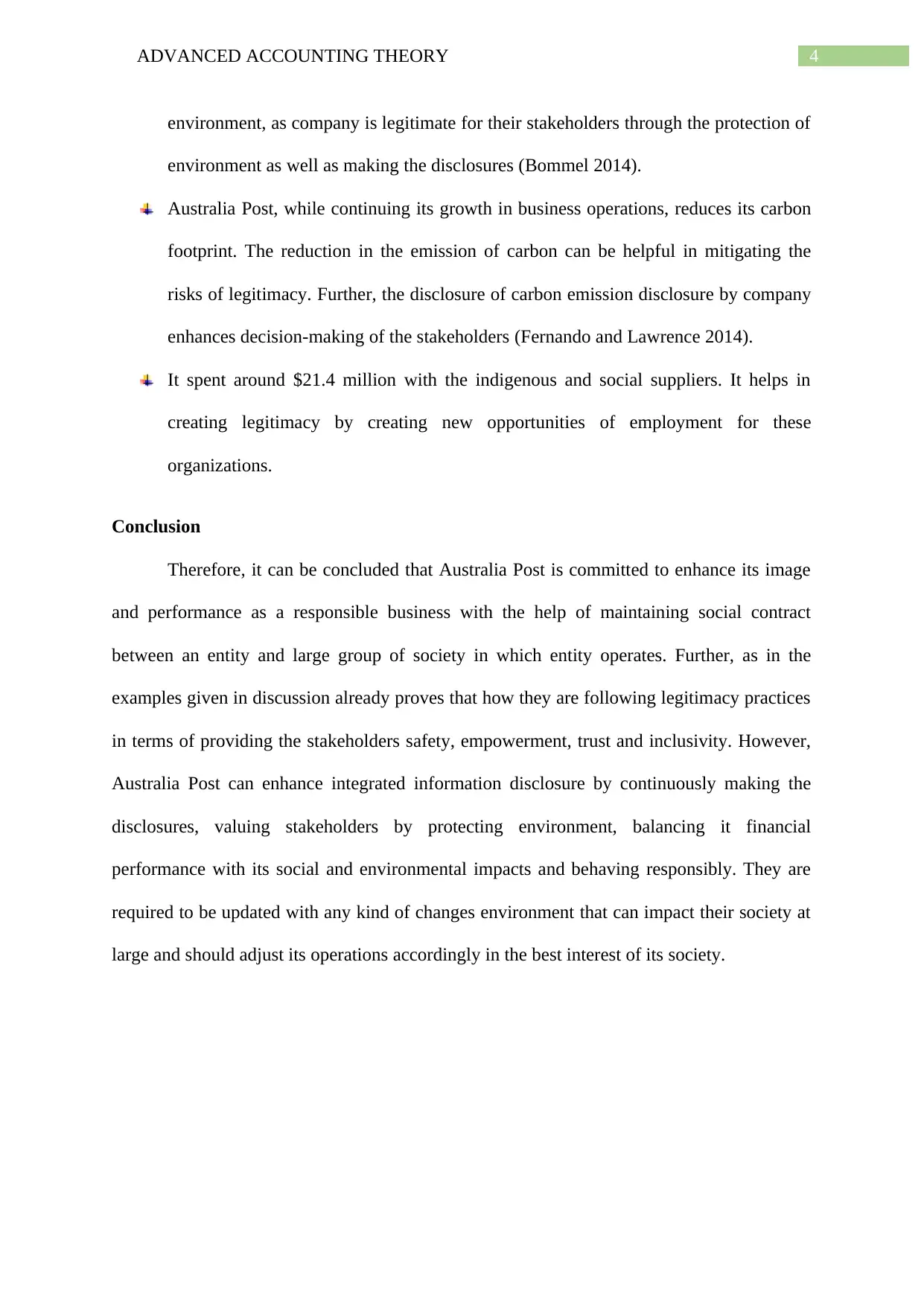
4ADVANCED ACCOUNTING THEORY
environment, as company is legitimate for their stakeholders through the protection of
environment as well as making the disclosures (Bommel 2014).
Australia Post, while continuing its growth in business operations, reduces its carbon
footprint. The reduction in the emission of carbon can be helpful in mitigating the
risks of legitimacy. Further, the disclosure of carbon emission disclosure by company
enhances decision-making of the stakeholders (Fernando and Lawrence 2014).
It spent around $21.4 million with the indigenous and social suppliers. It helps in
creating legitimacy by creating new opportunities of employment for these
organizations.
Conclusion
Therefore, it can be concluded that Australia Post is committed to enhance its image
and performance as a responsible business with the help of maintaining social contract
between an entity and large group of society in which entity operates. Further, as in the
examples given in discussion already proves that how they are following legitimacy practices
in terms of providing the stakeholders safety, empowerment, trust and inclusivity. However,
Australia Post can enhance integrated information disclosure by continuously making the
disclosures, valuing stakeholders by protecting environment, balancing it financial
performance with its social and environmental impacts and behaving responsibly. They are
required to be updated with any kind of changes environment that can impact their society at
large and should adjust its operations accordingly in the best interest of its society.
environment, as company is legitimate for their stakeholders through the protection of
environment as well as making the disclosures (Bommel 2014).
Australia Post, while continuing its growth in business operations, reduces its carbon
footprint. The reduction in the emission of carbon can be helpful in mitigating the
risks of legitimacy. Further, the disclosure of carbon emission disclosure by company
enhances decision-making of the stakeholders (Fernando and Lawrence 2014).
It spent around $21.4 million with the indigenous and social suppliers. It helps in
creating legitimacy by creating new opportunities of employment for these
organizations.
Conclusion
Therefore, it can be concluded that Australia Post is committed to enhance its image
and performance as a responsible business with the help of maintaining social contract
between an entity and large group of society in which entity operates. Further, as in the
examples given in discussion already proves that how they are following legitimacy practices
in terms of providing the stakeholders safety, empowerment, trust and inclusivity. However,
Australia Post can enhance integrated information disclosure by continuously making the
disclosures, valuing stakeholders by protecting environment, balancing it financial
performance with its social and environmental impacts and behaving responsibly. They are
required to be updated with any kind of changes environment that can impact their society at
large and should adjust its operations accordingly in the best interest of its society.
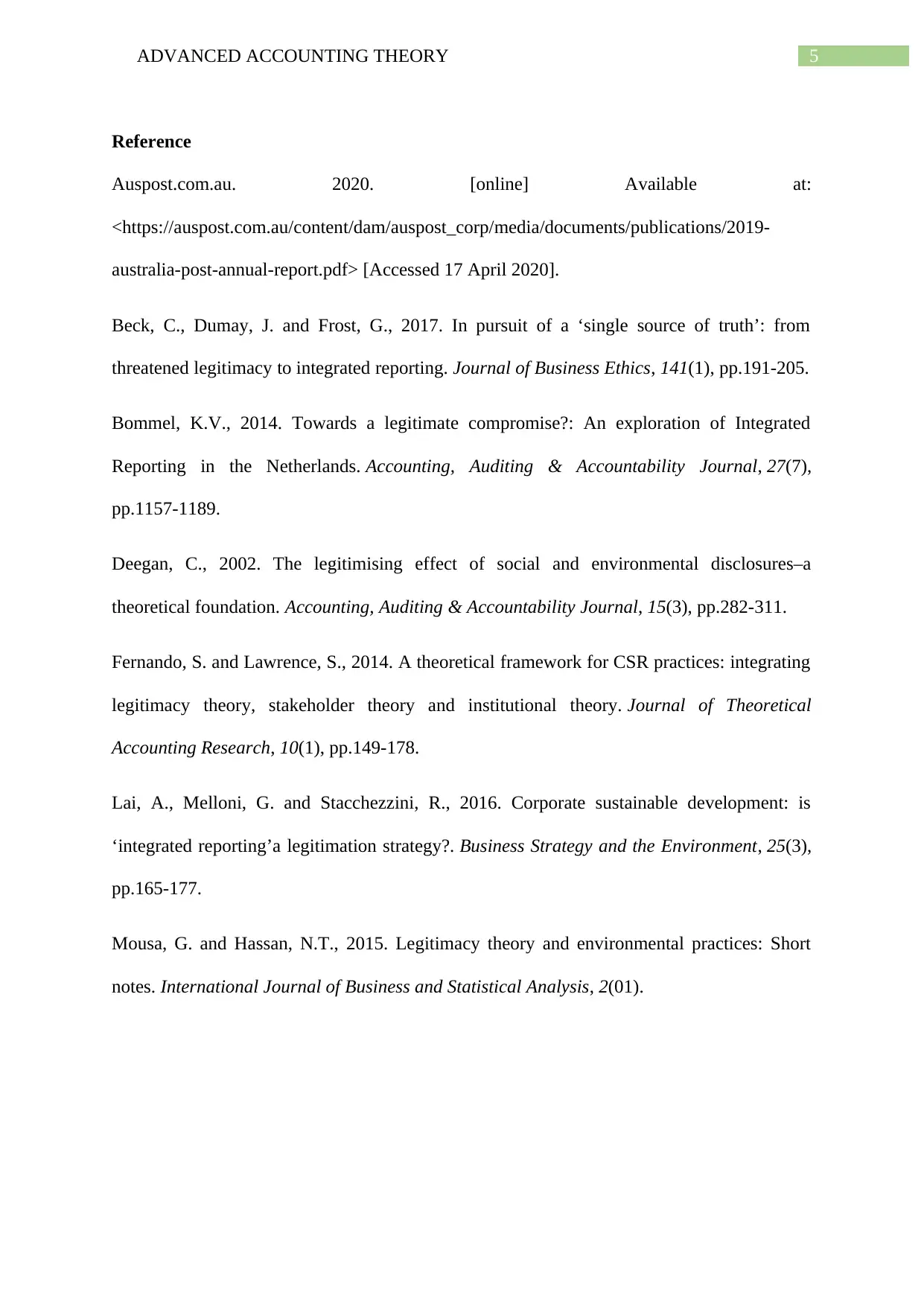
5ADVANCED ACCOUNTING THEORY
Reference
Auspost.com.au. 2020. [online] Available at:
<https://auspost.com.au/content/dam/auspost_corp/media/documents/publications/2019-
australia-post-annual-report.pdf> [Accessed 17 April 2020].
Beck, C., Dumay, J. and Frost, G., 2017. In pursuit of a ‘single source of truth’: from
threatened legitimacy to integrated reporting. Journal of Business Ethics, 141(1), pp.191-205.
Bommel, K.V., 2014. Towards a legitimate compromise?: An exploration of Integrated
Reporting in the Netherlands. Accounting, Auditing & Accountability Journal, 27(7),
pp.1157-1189.
Deegan, C., 2002. The legitimising effect of social and environmental disclosures–a
theoretical foundation. Accounting, Auditing & Accountability Journal, 15(3), pp.282-311.
Fernando, S. and Lawrence, S., 2014. A theoretical framework for CSR practices: integrating
legitimacy theory, stakeholder theory and institutional theory. Journal of Theoretical
Accounting Research, 10(1), pp.149-178.
Lai, A., Melloni, G. and Stacchezzini, R., 2016. Corporate sustainable development: is
‘integrated reporting’a legitimation strategy?. Business Strategy and the Environment, 25(3),
pp.165-177.
Mousa, G. and Hassan, N.T., 2015. Legitimacy theory and environmental practices: Short
notes. International Journal of Business and Statistical Analysis, 2(01).
Reference
Auspost.com.au. 2020. [online] Available at:
<https://auspost.com.au/content/dam/auspost_corp/media/documents/publications/2019-
australia-post-annual-report.pdf> [Accessed 17 April 2020].
Beck, C., Dumay, J. and Frost, G., 2017. In pursuit of a ‘single source of truth’: from
threatened legitimacy to integrated reporting. Journal of Business Ethics, 141(1), pp.191-205.
Bommel, K.V., 2014. Towards a legitimate compromise?: An exploration of Integrated
Reporting in the Netherlands. Accounting, Auditing & Accountability Journal, 27(7),
pp.1157-1189.
Deegan, C., 2002. The legitimising effect of social and environmental disclosures–a
theoretical foundation. Accounting, Auditing & Accountability Journal, 15(3), pp.282-311.
Fernando, S. and Lawrence, S., 2014. A theoretical framework for CSR practices: integrating
legitimacy theory, stakeholder theory and institutional theory. Journal of Theoretical
Accounting Research, 10(1), pp.149-178.
Lai, A., Melloni, G. and Stacchezzini, R., 2016. Corporate sustainable development: is
‘integrated reporting’a legitimation strategy?. Business Strategy and the Environment, 25(3),
pp.165-177.
Mousa, G. and Hassan, N.T., 2015. Legitimacy theory and environmental practices: Short
notes. International Journal of Business and Statistical Analysis, 2(01).
⊘ This is a preview!⊘
Do you want full access?
Subscribe today to unlock all pages.

Trusted by 1+ million students worldwide
1 out of 6
Related Documents
Your All-in-One AI-Powered Toolkit for Academic Success.
+13062052269
info@desklib.com
Available 24*7 on WhatsApp / Email
![[object Object]](/_next/static/media/star-bottom.7253800d.svg)
Unlock your academic potential
Copyright © 2020–2026 A2Z Services. All Rights Reserved. Developed and managed by ZUCOL.





